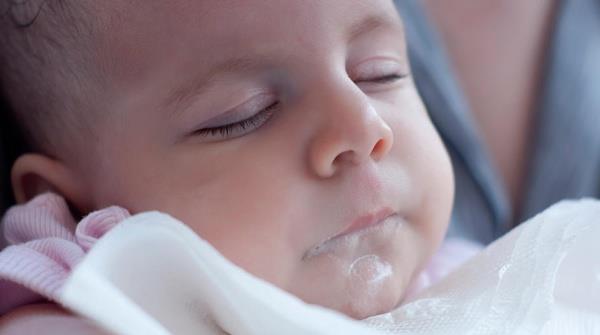It is quite common for a baby to vomit after eating, especially in the early years of life. Because during this stage, the baby's body is adjusting to the foods. However, there are also cases where vomiting is an unusual sign, so mothers need to learn to handle them promptly.
content
What signs is normal for vomiting with symptoms?
What do you do when your baby has no fever?
How to treat when a child eats food is vomiting
In addition to the baby vomiting due to a normal physical response, there are many other abnormal causes that lead to the baby vomiting. For example: due to fatigue, stress, overeating, bloating, slavery, food poisoning, cough, sickness .... All are dangerous cases mother should be wary of.
What signs is normal for vomiting with symptoms?
Vomiting is a common and fairly common phenomenon in early childhood. Because, this time baby is gradually adapting to the taste, with food, the baby's organs are gradually developing to "harmonize" with the food that babies eat every day.
Mother knows how to raise children need to distinguish between vomiting and vomiting. Vomiting is when a child vomits all the food eaten out. While spitting up is just a small amount of food with heartburn.
When finished eating, many babies vomit a little milk (vomit milk). The baby will be afraid and cry ... However, the spitting up will decrease if the baby does not play with after eating and it does not affect the baby's weight gain.
Here, vomiting is not too dangerous, you need to monitor the baby more, you need to be assured of the child's health as long as the baby is healthy, playing, gaining weight steadily.

Babies who vomit but do not have a fever, and still breastfeed, eat and play normally, mothers need not worry
Unusual manifestations when the child is vomiting
During your baby's first few months, vomiting can be caused by problems with food, or by bloating. Vomiting can be a result of problems with food hygiene or a disease related to the digestive system, especially during the first few months.
Mothers should call the doctor if they see the following signs:
Babies are vomiting and show signs of dehydration, including a dry mouth, dry eyes, and less urinating than usual
Children with fever, fever over 38 degrees, children with cold limb fever
Refuse to drink milk
Children vomit continuously for a long time, lasting for 24 hours
There is a phenomenon of shortness of breath, a fast heartbeat
Vomiting with blood and green bile
Persistent vomiting with diarrhea can be due to pyloric stenosis, urine infection, ear infection ... diseases that the baby is likely to have.

If the child vomits but has a fever, has difficulty breathing, or cries a lot, the mother needs to see a doctor immediately
What do you do when your baby has no fever?
When a child has a fever-free vomiting, first the mother needs to find out the exact cause of this condition. Then the mother can perform some of the following measures to help the baby quickly recover his health:
Keep your baby hydrated: Vomiting can dehydrate your baby. To replenish water for the baby mother should give the baby more rehydration solution. For babies who are breastfed or formula fed, the mother breastfeeds more.
Let your baby fully rest: When your baby sleeps, the stomach and intestines will be less irritated, making them less vomiting. Keep your baby asleep, he will quickly get better.
Help your baby get back to normal eating habits: After the baby vomits, the mother needs to help the baby get back into the daily eating habits. Mom can start to feed babies foods that are easy to digest such as bananas, yogurt.
Limit solid foods: When your baby is vomiting, mothers should not give them solid foods because they will cause indigestion. You should only give your baby solid food 6 hours after your baby's last vomiting. Avoid giving your baby spicy, fatty foods.
Create a comfortable environment: Bad smells, bright lights, or riding a car can also cause nausea. Mom should avoid stimuli such as the smell of perfume, smoke, or letting the baby stay in the secret room.
Do not give antiemetics to babies: Mother should not give antiemetics by themselves but need to consult a doctor.
How to treat when a child eats food is vomiting
Certain medical conditions can cause persistent vomiting in children. Before determining exactly what the baby is suffering from, the mother should try not to let the baby become more dehydrated.
Avoid letting your baby eat a lot at the same time. You should divide food into several small meals throughout the day. Should add more water to the baby's body.
However, the mother should not give the baby juice, just let the baby drink milk and boiled water. After eating, you can help me rub your back.
You should let your baby sit still, do not let the baby run, play, play at least 20 minutes after eating. After 14-24 hours, if you notice that your baby is no longer vomiting, the mother can feed the baby on a normal diet.
Do not give antiemetics to children without the permission of a doctor. If the baby is over 2 years old, the mother can mix warm ginger juice and give her baby a drink. Ginger has effects on the stomach and intestines and reduces nausea.

Children over 2 years old can give ginger tea to drink to reduce vomiting
According to doctor Nguyen Thu Thuy said on Health and Life newspaper, when a child vomits, he or she will lose a large amount of water. Therefore, it is important to replenish lost water so that the baby's body does not lose electrolytes. Parents can use Oresol solution, cooled boiled water or diluted juice.
If the child has persistent vomiting or vomiting due to a medical condition in which the child presents with symptoms such as fever, abdominal pain, drowsiness, convulsions, or constant vomiting, signs of dehydration such as: dry mouth, little tears, less urination… it is necessary to bring the child to the medical facility for prompt treatment.














